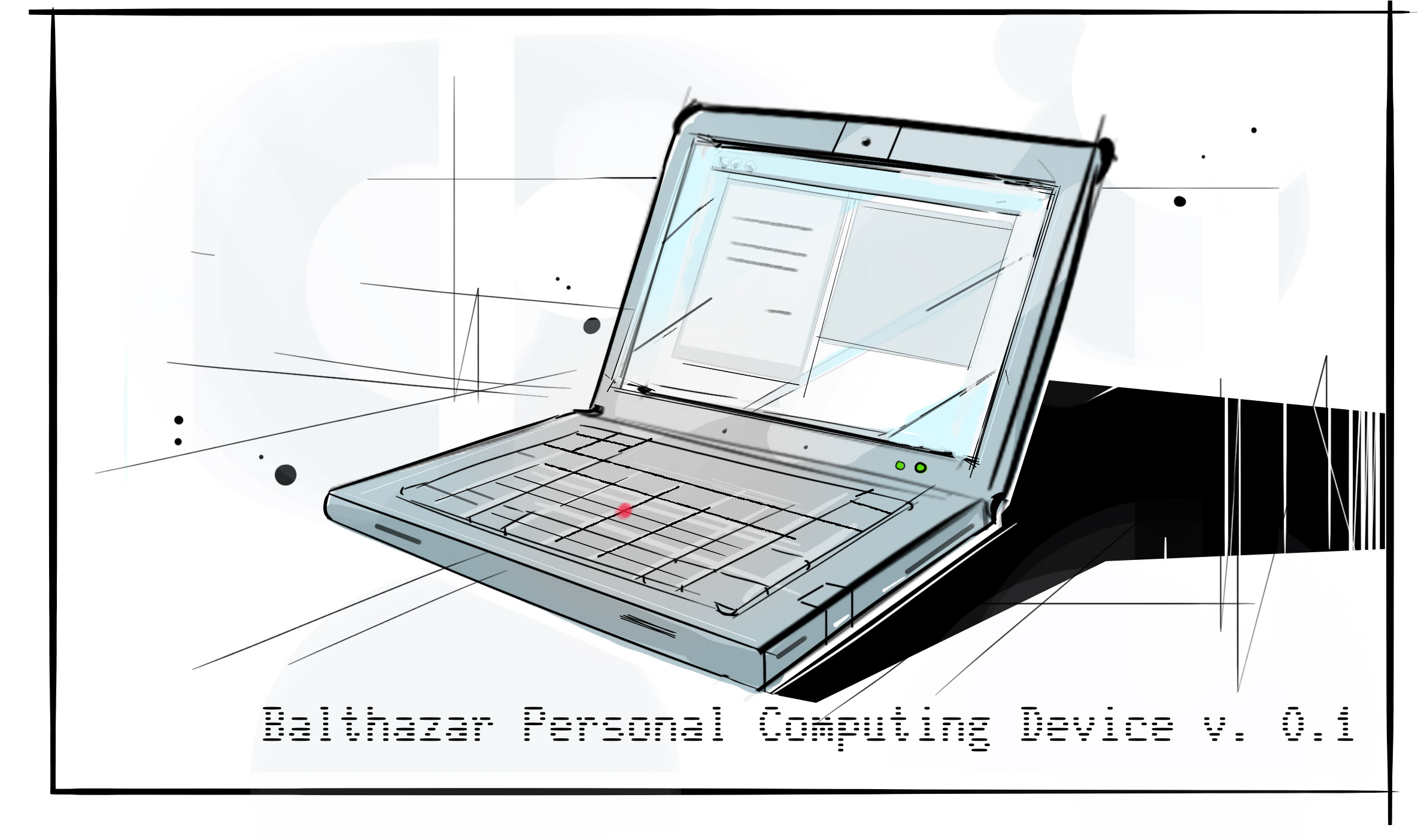a Personal Computing Device
One laptop for the new internet.
Secure, fast, inexpensive, open, robust, upgradeable and sustainable. All of that.
BPCD - Balthazar Personal Computing Device is a 13.3" upgradable and expandable laptop that is based on a few concepts inspired by EOMA68, but powered by RISC-V processor(s) open architecture that runs on Linux OS.
It contains all the hardware and continuously developing software features preventing data-theft and any unwanted 3rd party intrusion into the system by the default. Its default security layer software based on Libreswan is also envisaged to be GNUnet ready.
While being versatile and robust it also strictly follows GNU-GPL, FOSS, EOMA, ISA and even CC guidelines.
What is all that FOSS and CC and OS..? → Glossary
Why yet another laptop?
It is very expensive to buy an “advanced” or a secure laptop and it comes with usually "customised" and mostly proprietary software that bounds a user to a manufacturer. This is where BPCD comes in at the most possible lowest retail price that should be affordable to everyone - from an individual up to a big budgeted large institution.
But we have already have inexpensive netbooks, picturebooks, tablets, Chromebooks and alike!
Google, Samsung, Acer, Asus, Dell and the other respective manufacturers already make inexpensive and lightweight laptops, however they are locked in a certain software and hardware ecosystems and actually offer not too many security features. Also those devices do not work without the internet, so the reputation of such devices is often seen as a "personal data collecting devices", so that doesn't help to create a positive image towards such products.
It is the fact that such devices also appear less flexible towards full FOSS, GNU-GPL and EOMA guidelines that we want to use and set up as another standard for the new internet age.
Such ethical standard is not based on a mere profit, but on protecting and also educating users of all ages on how not to engage in a voluntary dissemination of their private data all over the internet, often being used as a bait for large companies that take an advantage and make amazing profits because of such illiterate, involuntary, unconsciousness and irresponsible behaviour.
BPCD is aimed to inexpensively enable end-user to control all the inputs via physical hardware switches and security dongles, preventing even a remote possibility to have system invaded or spied on by any 3rd party.
I have nothing to hide. Who should be your target group than?
Here are some use cases and personas to which Balthazar just might appeal:
1. An average basic internet user that requires some default security and develops a certain awareness on its own data privacy and is friendly-forced upon using the security and encryption through the default usage of the device.
2. Advanced computer users, journalists, governmental and public institution's workers that need secure hardware and software features to prevent an intrusion and the theft of sensitive data.
They are expected to be skilled and aware enough, so they can quickly understand UI, UX and are able to use additional AES encryption for the prevention of official and personal data protection through secure productivity apps and tools.
3. Educational institutions that will teach online security, privacy and safety. Also such institutions can make wide and creative use of a device’s on-board connections versatility and connectivity.
Proposed AOE for children and schools mode windowing environment and its User Interface and User Experience is utilising age-adoptive '''Aperture Operating Environment'''.
For more advanced use, now just as an example, it will feature a fully functional, secure, on-line and off-line, in a Webkit or a Blink browser
incorporated (a WARNING - not a secure page) Workbench that will have a range of fully customizable productivity apps, such as Text, WebDev, Paint and SVG editors amongst the other examples shown there.
This Workbench is meant to be based on a new WebShell environment still under the development.
Added to it all, educational community should find the value in overall physical sturdiness, software and a hardware sustainability of a BPCD.
What do you really want?
We want to enable and support low-income individuals and communities all over the planet, while carefully partnering with “humaine” and ethical corporations along the way. Those will participate as a co-creators and will get Balthazars to give away, rent or borrow BPCD to those who are unable to afford it. Or, alternatively they can build their own curriculum around Balthazar ecosystem.
We loosely partner with LEGO® Education, Google Education, educational institutions, various charities, foundations and EU initiatives, so we can only hope they can deliver expected behaviour and a practice.
So, Balthazar is NOT OLPC-alike, but it does follow some of the OLPC product design innovations and features, that are adopted and improved for today’s performance requirements, strictly focusing on privacy, safety and personal data protection and encrypted shared data or a retention of the same in its own “cloud”.
But... A "Cloud" is free, cool, useful and hype.
Remember - a “Cloud” is just other people’s or corporations’ computers that store your data when you do "share" your data with them.
So, why me or my children should want one?
Education being a very important issue today all over the planet is yet another field where BPCD could make an impact. New generations need to learn and understand the importance of being secure and how to care about their personal data.
It is also aimed at "the makers of the things" with 19 GPIO connectors on-board enabling users of all ages in controlling, testing and programming sensors, actuators and other electronic devices and gadgets from literally every manufacturer. Added to it, its value is increased with an optional add-on module with LEGO® specific RJ-12 and Power Functions connectors.
TL;DR For the children age 9-99.
Want to know more?
Please read the specifications and features.
